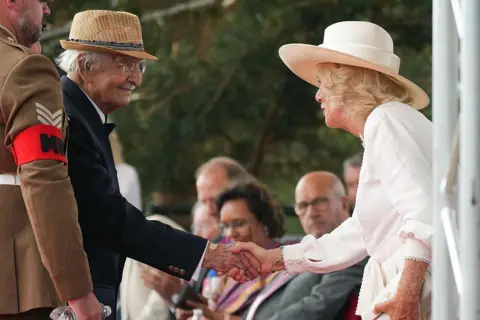**The Journey of Yavar Abbas: A Centenarian’s Tale of Valor and Reflection**
At 104 years old, Captain Yavar Abbas has become not only a symbol of resilience but also a bearer of poignant memories. Recently, he captured the attention of King Charles III and Queen Camilla during the official commemoration of the 80th anniversary of VJ Day in Staffordshire. As one of the last remaining veterans of World War II, he delivered his address with an unexpected emotional tone, expressing gratitude towards the King, who is currently battling cancer. This heartfelt acknowledgment visibly moved both the King and Queen, showcasing the deep connection shared among those who endured the hardships of war.
Yavar’s remarkable journey began in Charkhari, a town in British India, where he was born on December 15, 1920, although officially recorded as 1921. He was just a student when Britain declared war on Nazi Germany in 1939. However, as the war intensified, a new enemy emerged with Japan’s attack on Pearl Harbor in December 1941. Following this attack, Yavar was faced with a critical choice between fighting for the British Empire or aligning with India’s emerging independence movement, which vehemently called for the British to “Quit India.” Though he harbored disdain for British imperialism, Yavar was also acutely aware that the threat posed by fascism and Nazism superseded his feelings toward colonial rule.
Driven by the hope of post-war independence for India, Yavar enlisted in the British Indian Army and ultimately joined the 11th Sikh regiment. Initially, he found himself stuck in a remote location performing monotonous duties, which fueled his frustration with both the lack of action and the dismissive attitudes of British officers toward Indian soldiers. His breakthrough came when he spotted an advertisement for officers to receive training as combat cameramen. Seizing the opportunity, he applied and was subsequently assigned to the British 14th Army, which was tasked with reclaiming territory lost to the Japanese in several crucial battles over the course of the Burma campaign.
Throughout the war, as part of the 14th Army, Yavar experienced camaraderie among soldiers of various nationalities, vastly different from his earlier encounters. He found himself filming at the front lines during pivotal battles including the siege of Imphal and the battle of Kohima—conflicts that would significantly impede Japanese advancement into India. Equipped with his film camera, Yavar documented harrowing scenes, capturing the realities of war as he navigated through danger. One chilling reminiscence involved surviving a sniper’s bullet, which struck close to him as he filmed, a stark reminder of the perilous environment he operated in.
In the waning days of the war, Yavar experienced the surrender of Japan following the bombings of Hiroshima and Nagasaki, which left an indelible mark on him. He later expressed horror at the devastation he witnessed upon visiting Hiroshima as part of the British Commonwealth Occupation Forces, a sight that still haunts him today. This reflection underscores the deeper realizations he has garnered from his experiences—war, regardless of its motivations, brings immense suffering.
Despite participating in a monumental part of history, Yavar is candid about his feelings toward VJ Day, describing it as a solemn occasion rather than one of celebration. He reflects on the contemporary conflicts around the world, expressing concerns that humanity has learned little from the past. “War is a crime,” he asserts, encapsulating the futility of armed conflict in his view. His poignant observations are rooted in profound empathy, as he observes the ongoing suffering of innocent lives caught in the cycle of violence.
As Yavar Abbas continues to share his stories, he not only honors the valiant souls of the past but also serves as a clarion call for peace and understanding in a world that often seems to forget the lessons of history. His reflections remind us of the complex legacies of war and the human experiences that transcend generations, urging a collective responsibility towards peaceful coexistence.












